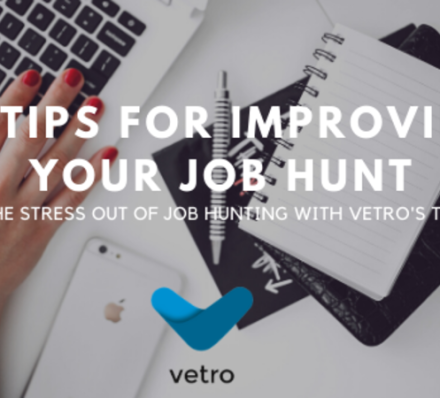Finding a new job can be a challenging and frustrating experience for most but you can make the job search easier on yourself if you use proactive strategies for finding a new job.
Finding a new job can sometimes be a challenging and frustrating experience. But there is good news! You can make the job search much easier for yourself by using these tips to help you navigate the path to a new role.
Here are some of Vetro’s best tips for finding a new job at any career level:
Be clear on what you want
Before starting your job search, take the time to reflect on your strengths and weaknesses and the type of work you enjoy doing. The better you know yourself, the more likely you’ll find a new job that provides you with greater satisfaction. What do you want in a job? What’s most important, title, money, promotion, the work itself, location, or company culture?
Research your preferred sector
Once you know what you want, it’s time to find out what is expected in the sector you’re applying for. A great way of gathering this information is to talk to someone within that industry. It will help you get a feel for the culture, figure out what questions you might be expected to answer, and even discover what salary you’re likely to be paid.
Tailor your CV to each job application
Your CV is still one of the most critical tools of a job search. Take time to ensure it's a tool that will work for you!
A lot of CV’s we see are full to the brim with roles and responsibilities that a candidate has undertaken. It's a download of every little achievement and accolade that person has had in their life, they are long and they will never be read in full, they have too much in them, they lose impact. The job seeker will then send this same CV to lots of different job openings.
We would advise you to tailor your resume to each job – the recruiter should know within a few seconds of looking at your resume that you have the skills they are looking for. Make yourself an obvious fit. Study the words and phrases that are used in the job description and make sure you include them in your resume.
Create your own online brand
Building your brand simply means showcasing your expertise and passion online where employers searching the Web can find it. Most recruiters, including those of us at Vetro, use LinkedIn as a search tool and if you’re a professional, you need to be using LinkedIn to your full advantage. It’s a great resource for finding people working at companies that interest you and also for positioning yourself to be found by recruiters and hiring managers with relevant openings.
Get organised
Before you start applying for jobs or interviewing with employers, take a moment to develop a system that works for you in organising your job search. A simple spreadsheet works best for many to keep a track of the jobs you’ve applied for, where you have been invited to interview, etc.
Build, cultivate and utilise your network of contacts
For the vast majority of jobseekers, a large and strong network of contacts — people who know you and want to help you uncover job leads — results in more job opportunities.
This also helps you to get a good idea of what is out there and available, so you can be more strategic in your job search. Don’t be afraid to reach out to people on LinkedIn, and if you know someone working at a company that interests you, ask for a referral. Hiring managers would prefer to interview people who came recommended before sorting through the resumes arriving via a career website.

Aim to complete job-related goals daily
It takes a great deal of time and effort to find a new job. In a long job search, it’s easy to get discouraged and distracted, but by focusing on achieving daily goals you can motivate yourself while also building a foundation for success.
Be kind to yourself
Looking for a job can be stressful. So, take some time to meditate, exercise, watch a movie or whatever it is that helps you unwind. Create a good support network – having people to brainstorm with or vent your frustrations to will help the process be less painful.
Develop examples and stories that showcase your relevant skills
This is one of the main tips for finding a new job. People remember stories, so your goal should be developing a set of interview stories you can use in job interviews that clearly demonstrate your skills, achievements, and passion for your work. Be memorable! Using stories (use the STAR format) may also help you feel more comfortable talking about yourself.
Prepare for all job interviews
Before you get called for your first interview, develop responses for common interview questions, and then practice them — ideally using the mock-interviewing technique. The more prepared you are for the interview, the more comfortable you’ll be – and the more likely you’ll succeed.
READ OUR HOW TO ACE THE INTERVIEW BLOG
Follow up with your recruitment consultant or hiring manager
Your work is not done once the interview is complete or the thank-you note sent. Following up with the hiring manager shows your interest and enthusiasm for the job. The key is doing so in a way that is professional while not making you sound pesky or needy.
Expect the job search to take longer than you think
You can hope to have a new job within a short period, but the likely reality is that it might take months to find the right opportunity and get offered the position. You should mentally prepare yourself for a long battle — and then you can be happily surprised if you are one of the lucky few whose job search is short.

Final thoughts on bettering your job hunt:
Here are a few other tips for finding a new job:
First, having both a positive attitude and outlook is extremely important.
Secondly, remember that you may need additional training or experience, especially if you are entering a new career field. This is an opportunity to learn something new and enhance your knowledge, which can only be a good thing.
Lastly, if you are new to a career field, you may need to consider temping or volunteering for a short period to gain experience and build network contacts that can lead to a full-time position.




